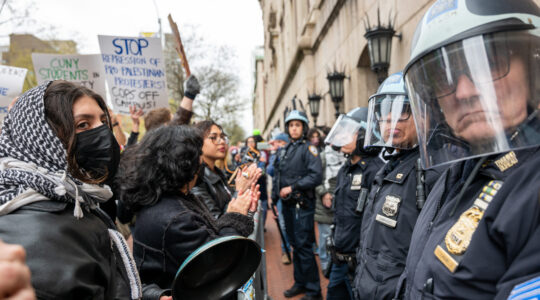In attacking radical Independence Party activist Lenora Fulani as anti-Semitic this week, Hillary Rodham Clinton has taken a step forgone by three previous Democratic Senate candidates: two of whom are Jewish.
In the 1998 Senate race, Public Advocate Mark Green and Charles Schumer, then a congressman, solicited Fulani’s faction of the eclectic Independence Party without commenting publicly on her record of controversial statements about Jews and her support of Nation of Islam leader Louis Farrakhan. The same goes for the third Democrat seeking to unseat Sen. Alfonse D’Amato that year, Geraldine Ferraro.
Although Green ultimately won the support of Fulani’s Manhattan-based Committee for a United Independence Party, Schumer later wrote to Cathy Stewart, a close ally of Fulani, to declare that "my phone lines are always open to you," according to a copy of the letter obtained by The Jewish Week.
Schumer went on to win the statewide Independence nomination and the Senate race.
But Clinton, who has been accused of being too cozy with the Rev. Al Sharpton and Yasir and Suha Arafat, took pains to denounce voices of "anti-Semitism, extremism, prejudice and intolerance" (as manifested by Fulani and her unlikely bedfellow, Pat Buchanan) at Saturday’s Independence forum in Buffalo. Her Republican rival, Mayor Rudolph Giuliani, made a pitch for the party’s endorsement at the same forum without mentioning either figure. He even politely interacted with Fulani, who has accused Jews of mass-murdering blacks, during a question-and-answer session.
Supporters of the first lady, such as former White House adviser George Stephanapolous, likened the incident to Bill Clinton’s notorious 1992 "Sister Souljah" speech in which he used a forum before a black audience to attack a rap singer’s violent lyrics, illustrating that he did not pander.
"She declared her independence from some of the people in New York who believe you can’t correct a person of color, even if they make an anti-Semitic comment," said one Democratic insider, who said Clinton was under pressure from Schumer and Housing Secretary Andrew Cuomo to seek the Independence nomination without controversy.
But adversaries note that the Clintons have been courting the state Independence Party for a year, trying to win the support of Rochester millionaire Thomas Golisano (a key party figure) to help secure the ballot line. Independence is the third largest party in the state with 172,000 members.
"It wasn’t until they had no hopes of winning the line that she attacked Buchanan and Fulani," said Giuliani campaign manager Bruce Teitelbaum, who said Clinton was trying to "rehabilitate her image" among Jews.
While she is tied with the mayor among Jews in most polls, she is still far short of the two-thirds of that vote Democrats have traditionally needed to win statewide office, he noted.
On Monday Clinton, who was hurt by her failure to immediately denounce Suha Arafat when she maligned Israel in November, seemed to be wearing her public battle with Fulani as a badge of honor. Her campaign took the unusual step of calling reporters to make sure they knew that Fulani was holding a press conference in which she, in turn, denounced Clinton.
"We don’t appreciate a carpetbagger from Arkansas coming to New York and telling us who is and isn’t an acceptable black leader," said Fulani, calling Clinton’s tactic a "slanderous political ploy."
Support the New York Jewish Week
Our nonprofit newsroom depends on readers like you. Make a donation now to support independent Jewish journalism in New York.
But observers see Fulani as a valuable adversary for Clinton. "In New York you are known for your enemies, not by your friends," said Mitchell Moss of the Taub Center for Urban Research at New York University. "Fulani is inadvertently helping Mrs. Clinton through her attacks."
Clinton’s aides, who have backed off criticism of the mayor since his diagnosis with prostate cancer, did not attack Giuliani for failing to denounce Fulani and Buchanan, as they did when he warmly greeted Austrian extremist Jorge Haider at a dinner in January, claiming he did not recognize him. Giuliani has denounced Buchanan’s views on Israel and the Holocaust on several prior occasions.
When Fulani asked the mayor if he thought the Independence nomination would help him with minority voters Saturday, Giuliani replied it might. "He answered a thoughtful question in a civil manner," said Teitelbaum. "If he hadn’t, people would have said he was reverting to his old form."
At her press conference Monday, Fulani painted herself as a victim of the Democratic Party and the Anti-Defamation League, which has issued reports on Fulani’s activism.
"I am not anti-Semitic," she said, insisting that use of that label was "a politically correct way of attacking black leadership."
Fulani said she did not recall making a remark cited in an ADL report that Jews "had to sell their souls to acquire Israel, and are required to do the dirtiest work of capitalism (to function as mass murderers of people of color) in order to keep it."
An ADL researcher later faxed The Jewish Week a copy of an article under Fulani’s byline in the National Alliance (an organ of the now-defunct New Alliance party) containing the quote as written in the report.
In a subsequent phone interview, Fulani said the statement was written "in the context of … teaching people about the pitfalls of being organized by nationalism."
Clinton’s campaign disseminated anti-Fulani statements from several prominent African American Democrats Monday, including former Mayor David Dinkins, who said he was in "violent disagreement" with Fulani.
The only political figure to come to Fulani’s defense was Sharpton, who called her "a fighter for civil liberty and community empowerment."
In other Senate race news, Giuliani’s campaign is attacking Clinton for accepting contributions from an Arab American with ties to Yasir Arafat.
Hani Masri, a native of Nablus who has served as a Jordanian diplomat, contributed $1,000 to Clinton’s Senate campaign, plus $20,000 to the Democratic Party’s soft money Senate fund.
Support the New York Jewish Week
Our nonprofit newsroom depends on readers like you. Make a donation now to support independent Jewish journalism in New York.
Masri, a successful businessman and naturalized American, hosted a 1988 fund-raiser for the Rev. Jesse Jackson at a time when he was pushing a radical pro-Palestinian plank in the Democratic Party, as well as a dinner for Arafat shortly before Giuliani kicked him out of a Lincoln Center concert.
"This latest revelation isnít surprising since Mrs. Clinton has accepted money from a whole host of individuals that we would never accept money from," said Teitelbaum.
Clinton spokesman Howard Wolfson defended the donation as "perfectly appropriate," noting that Masri had attended the funeral of slain Israeli Prime Minister Yitzchak Rabin.
A subsidiary of Masri’s Capital Investment Management Corp. is managing a venture capital fund in Palestinian territories initiated by Israel’s Peres Center for Peace.
Assemblyman Dov Hikind and Councilman Noach Dear have long been considered political enemies in their Borough Park community, but there was no sign of that discord Saturday night as Hikind hosted Dear on his radio show on WMCA (570 AM). The softball interview left many listeners wondering if Hikind was supporting Dear’s bid to unseat Rep. Anthony Weiner.
Dear has been aggressively raising funds (some $480,000 so far this year) and recently netted some $50,000 at a Borough Park dinner hosted by George and Michael Karfunkle, who also raised money for Schumer.
But Hikind said he had made no decision in the November primary for Weiner’s Brooklyn-Queens seat. "At this point I am definitely not committed to anyone," he said. Hikind added that reports of an ongoing rivalry with Dear have been exaggerated.
In another segment of Hikind’s show, co-host Charni Shochet pointed out that Hillary Clinton’s recent disassociation with a charity of Arab diplomats had "antagonized" Arab Americans.
"Sounds good to me," said Hikind, an opponent of the Oslo Accords whose support Clinton has been courting. "If we can get her to antagonize them a lot more, it would be really good."




